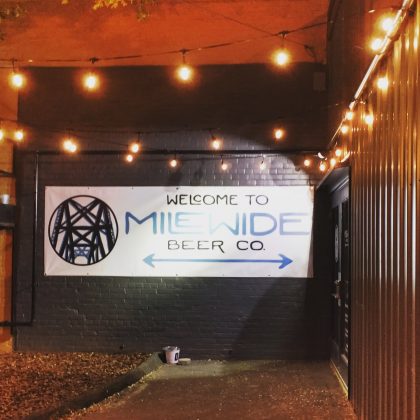When it comes to beer, I’ve sworn off end-of-the-year lists, enumerations and reflections, primarily because the sheer volume of great beers and wonderful drinking experiences in a typical twelve-month time span overwhelms my ability to recount. Perhaps it is short-term memory loss, or more likely an embarrassment of riches. Either way, It’s time better spent enjoying yet another wonderful beer.
That’s my perspective, and when we speak of having perspective, our ultimate objective is gaining understanding from experience by means of contextualizing. It is a multi-dimensional process, one that never ceases until life comes to an end.
Of course, it remains that no matter how hard one tries to gain perspective, it seldom is transferable to others. This is why your barroom, as opposed to ballroom, is the contemporary agora, suitable for drinking, thinking and sharing. While electronic advancements can convey these discussions to the planet at large, they cannot capture the twinkle in a bar fly’s eye, or the full measure of perspective’s renewal amid the onslaught of progressive pints.
All these thoughts crossed my mind a few weeks back, when me and Sierra traded perspectives.
A Healthy Distrust Part Deux: New Albanian and Sierra Nevada debate on Twitter
New Albanian Co-Owner on discourse with Sierra Nevada
Sierra Nevada has been brewing in California for 31 years, and now it is planning an expansion to America’s eastern shore, the better to serve thirsty, populous areas by means of a gentler carbon footprint. Brewery-rich Asheville, North Carolina, is the likely choice for Sierra’s new facility, and the county fathers there have assembled an incentive package appropriate for the newcomer. Colorado’s New Belgium has been considering precisely the same strategy of “Go East, Relatively Youthful Brewery.”
I’ve found it instructive that every bit of the persuasive reasoning for these and other craft brewery expansion projects, up to and including the reduction in pollution (and lower transportation costs) to be achieved by closer proximity to markets, have parallels in the past, as deployed by the multinationals and megabreweries against whose monopolistic practices craft brewing has had to labor for so hard and long.
After all, what led to the establishment of a dozen regional Budweiser breweries rather than just one in St. Louis? Why did Guinness contract brew at plants located around the world, rather than ship directly from Dublin? As long as wheels stay round, there hardly exists any reason to reinvent them.
By musing aloud on questions like these – in large measure, by merely implying them – I experienced a pleasurable firestorm of differing perspectives from across the nation. Unfortunately, a good many of these were startlingly overt:
Who the hell is this trolling asshole, and who does he think he is to be questioning the Gods?
Because, that’s what philosophers do.
The questions asked had to do with ideas, which still matter. Specifically, I wanted to know about concepts of locality and appellations of origin, formal or implied, which often have prefaced the craft beer movement.
If a brewery’s metaphorical image has derived from one sense of place for three decades, does it remain the same image should production be conducted elsewhere? Is it the same brewery, or is it a different one?
When a representative from Sierra Nevada joined the discussion, it became immediately obvious that the company has been thinking deeply about precisely the sort of questions I chose to ask. It would have surprised me had it not.
From the standpoint of perspective, it soon struck me that Sierra’s language and my language were one and the same. We understood each other. Conversely, another dialect entirely was being spoken by other participants in the discussion.
Now, the internet and aggression go hand in hand; nothing new there, but what stood out to me was the sheer acceptance of Sierra’s line – the credulity of it all. One commentator held that businesses don’t ever revolutionize, they merely capitalize, an assertion that would amuse Steve Jobs, and probably Sierra Nevada’s Ken Grossman, too. Another person wrote that for him, Grossman could do no wrong.
Really?
I submit that craft brewing surely is a revolution, and also that not one of its standard-bearers is infallible, including me. I seriously doubt that Grossman, who I haven’t met, fancies himself as perfect, although from what I’ve heard, he would grasp that hostility to his company was completely absent from my arguments. At the time, the NABC Public House & Pizzeria had three Sierra Nevada beers on tap: Celebration Ale, Torpedo IPA and Ovila Quad.
If I really held a grudge against Sierra Nevada, would I be pouring these?
My tip for 2012 is this: Craft beer isn’t a kid any longer. It’s growing up, and fast. There are many questions to be asked as it does. They need to be asked, not suppressed.
What I’ve learned in 2011 is that while some craft beer lovers feel a sense of entitlement when it comes to the plethora of choice in the marketplace, they have precious little notion of how that cornucopia came to be.
Craft Beer Nation came to be because of a revolution, and that revolution had (and continues to have) certain precepts. To an extent, these are mutable and subject to revision, but core values are just that. Questions constitute an opportunity to educate, to learn, and to know. They are not threats.
Without better thinking, what possible usefulness can there be in better drinking?





